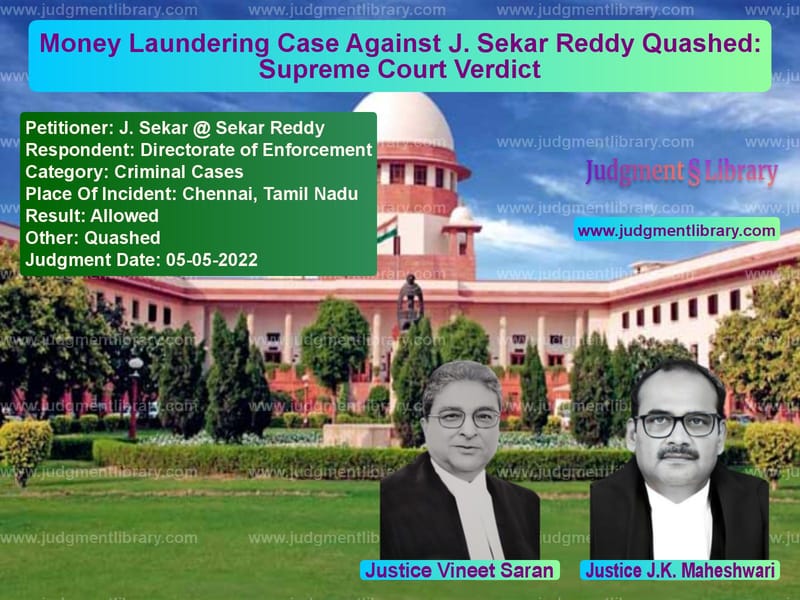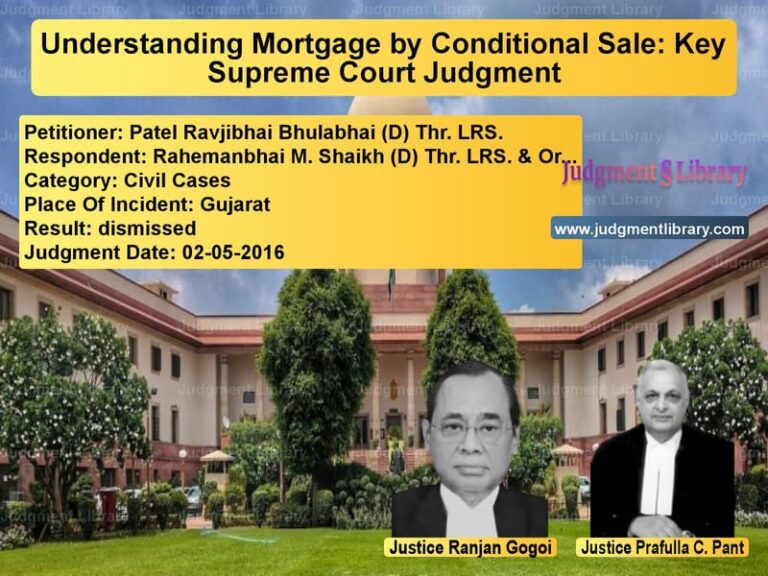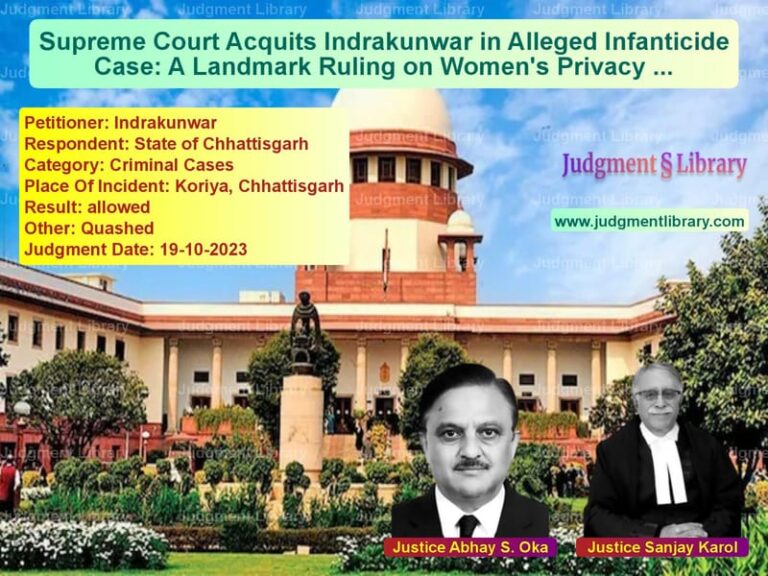Money Laundering Case Against J. Sekar Reddy Quashed: Supreme Court Verdict
The Supreme Court of India recently delivered a significant ruling in the case of J. Sekar @ Sekar Reddy vs. Directorate of Enforcement. This case involved allegations of money laundering against the appellant, stemming from large-scale cash seizures by the Income Tax Department during the 2016 demonetization period. The case raised crucial legal questions regarding the necessity of a predicate offence for prosecuting a money laundering case under the Prevention of Money Laundering Act, 2002 (PMLA).
The Supreme Court’s ruling quashed all proceedings against J. Sekar Reddy, highlighting the absence of substantive evidence linking him to a scheduled offence under PMLA. The judgment reinforces fundamental legal principles regarding fair trials and procedural safeguards in money laundering cases.
Background of the Case
J. Sekar Reddy, a businessman engaged in sand mining, was the Managing Partner of M/s SRS Mining. His firm had deposited substantial amounts in bank accounts, which attracted scrutiny from the Income Tax Department.
On December 8-9, 2016, during the demonetization period, the Income Tax Department conducted raids at his premises, seizing:
- Cash amounting to ₹106.98 crores
- 128.495 kg of gold valued at ₹36.72 crores
Subsequently, the Central Bureau of Investigation (CBI) registered a case against him and two others under various sections of the Indian Penal Code (IPC) and the Prevention of Corruption Act, 1988.
Key Legal Issues Before the Supreme Court
- Whether the case could proceed under PMLA when the predicate (scheduled) offence was not established.
- Whether the adjudicating authority’s refusal to confirm the attachment of assets affected the prosecution’s case.
- The significance of the Income Tax Department’s acceptance of Reddy’s financial disclosures.
Arguments Presented
Petitioner’s (J. Sekar Reddy) Arguments
- The petitioner argued that the PMLA case against him was unsustainable because there was no scheduled offence under the Act.
- The CBI had closed the primary case against him for lack of evidence, and two other cases filed under PMLA were quashed by the High Court.
- The Income Tax Department had accepted that the seized cash belonged to M/s SRS Mining and was properly accounted for.
- The Enforcement Directorate’s case was based on assumptions without substantive proof.
- Since the funds were already taxed, the allegations of illicit transactions or money laundering were baseless.
Respondent’s (Directorate of Enforcement) Arguments
- The ED contended that the case involved large-scale money laundering linked to demonetization.
- The agency argued that Reddy and others had illegally converted old currency into new notes with the help of bank officials.
- The agency asserted that the PMLA case could proceed independently, even if the predicate offence had been closed.
Supreme Court’s Observations and Ruling
1. Absence of a Predicate Offence
The Court ruled that for an offence under PMLA to stand, there must be a confirmed scheduled offence. Since the CBI had filed a closure report in the primary case, there was no predicate offence. The Court referred to the judgment in Radheshyam Kejriwal vs. State of West Bengal, which held that if an adjudicatory authority exonerates an accused on merits, criminal prosecution should not continue.
2. Adjudicating Authority’s Findings
The Court noted that the PMLA adjudicating authority had refused to confirm the asset attachment because:
- There was no evidence linking bank officials to illicit currency exchanges.
- The Enforcement Directorate’s claims were based on conjecture rather than solid proof.
3. Income Tax Department’s Acceptance of Reddy’s Financial Disclosures
The Income Tax Department’s findings were critical. It had verified that the seized currency was from the proceeds of sand sales and was properly accounted for. The department had even confirmed that all due taxes had been paid on these funds.
4. Lack of Evidence for Money Laundering
The Supreme Court emphasized that under PMLA, allegations must be proved beyond reasonable doubt. The authorities failed to establish a clear money laundering trail.
Impact of the Judgment
The Supreme Court’s ruling has significant implications:
1. Strengthening Legal Safeguards in PMLA Cases
This ruling reinforces that an individual cannot be prosecuted under PMLA without a predicate offence. It protects against arbitrary and prolonged prosecutions.
2. Preventing Abuse of the Law
The judgment prevents enforcement agencies from pursuing cases without substantial evidence. It ensures that financial investigations are based on facts rather than assumptions.
3. Clarifying the Role of Tax Authorities
The ruling highlights that once the Income Tax Department accepts financial disclosures and clears transactions, parallel money laundering cases cannot be pursued without strong evidence.
Conclusion
The Supreme Court’s decision in the J. Sekar Reddy case sets an essential precedent in Indian law, ensuring that PMLA cases are not pursued in the absence of a confirmed predicate offence. By quashing all proceedings, the Court reaffirmed the importance of fair legal procedures and evidence-based prosecution. This judgment will likely influence future cases where enforcement agencies attempt to apply PMLA without proving a foundational offence.
Petitioner Name: J. Sekar @ Sekar Reddy.Respondent Name: Directorate of Enforcement.Judgment By: Justice Vineet Saran, Justice J.K. Maheshwari.Place Of Incident: Chennai, Tamil Nadu.Judgment Date: 05-05-2022.
Don’t miss out on the full details! Download the complete judgment in PDF format below and gain valuable insights instantly!
Download Judgment: j.-sekar-@-sekar-red-vs-directorate-of-enfor-supreme-court-of-india-judgment-dated-05-05-2022.pdf
Directly Download Judgment: Directly download this Judgment
See all petitions in Money Laundering Cases
See all petitions in Fraud and Forgery
See all petitions in Judgment by Vineet Saran
See all petitions in Judgment by J.K. Maheshwari
See all petitions in allowed
See all petitions in Quashed
See all petitions in supreme court of India judgments May 2022
See all petitions in 2022 judgments
See all posts in Criminal Cases Category
See all allowed petitions in Criminal Cases Category
See all Dismissed petitions in Criminal Cases Category
See all partially allowed petitions in Criminal Cases Category







